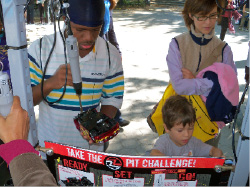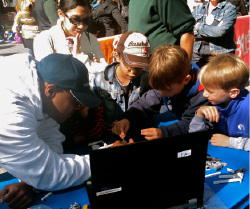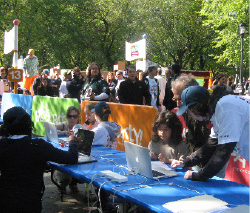Party in the Park
Thousands of families converged on Central Park to engage in the serious academic exercise known as "play" at "The Ultimate Block Party"--an event cosponsored by TC.
By Rich Monetti
On a bright Sunday afternoon in October, thousands of families converged on the Band Shell area in New York City’s Central Park to engage in the serious academic exercise known as “play.” Organized by Play for Tomorrow, a national consortium of educators concerned about the ever-dwindling role of play in learning, “The Ultimate Block Party,” featured a range of activities that included jumping rope, building skyscrapers, drumming and what may have been New York’s largest-ever game of Simon Says. TC’s Office of Schools and Community Partnerships was one of several co-sponsors of the event.
“The kids looked serious because they were engaged,” said Roberta Golinkoff, one of the event’s coordinators, who holds the H. Rodney Sharp Chair in the School of Education at the University of Delaware. “Joy is what comes out of play.”
Learning does, too. At the RideMarkerZ pit stop, children pieced together miniature remote control cars and then took their personalized creations out for a spin. “This is better than the textbook science because it’s hands on,” says Chris McZeke, who works for RideMarkerZ. “You can’t find these wheels at Wal-Mart.”
Under the guidance of TC volunteers, led by TC doctoral students Carol Lu and Cameron Fadjo, from TC’s Institute for Learning Technologies, children also built programmable LEGO Mindstorms robots, complete with sensors that respond to light, noise and touch and used the computer programming language Scratch to modify and enhance games and digital stories.
“Parents might not think immediately of the local university as a family-friendly place with an open door but that’s what we try to be,” said Emily Zemke, TC’s Associate Director of School Partnerships.
TC volunteers also helped children to probe the inner workings of video games using Scratch, a user-friendly programming language developed by MIT Media Lab. “I would first ask kids if they wanted to play a game, then ask them how they might want to change it,” said Megan Myers, a TC master’s student in Instructional Technology and Media who guided children, in creating animated computer graphics and telling stories using digital media. “Frequently, they came up with very creative and innovative ways to change the game,” says Myers.
Fadjo, a second-year doctoral student in the Cognitive Studies in Education program and the lead Scratch coordinator, called the Block Party, “a unique opportunity to share some of the technology-based research currently being conducted in Upper Manhattan—specifically, Harlem and Washington Heights—using Scratch.”
Volunteers from another Ultimate Block Party sponsor, the University of Washington’s Institute for Learning and Brain Sciences (ILBS), led children in games of bilingual Bingo. Pat Kuhl, ILBS, said that bilingual people tend to have more flexibility in how they approach problems and complex issues.
“They are switching back and forth between languages all the time,” he said, “and that builds thought flexibility. So having kids play games like bilingual bingo can start them on a course where staying open-minded is a part of life.”
Ultimately, the event’s organizers hope that policymakers get the message about play, too.
“Hopefully our country can overcome a consensus that has schools cutting recess and play-based learning,” said Kathy Hirsh-Pasek of Temple University.
Jana Finch, a New Jerseyan who brought her young sons to the Block Party, agreed. “We sometimes forget about basic play and how simplicity inspires creativity.”
Published Monday, Nov. 22, 2010


